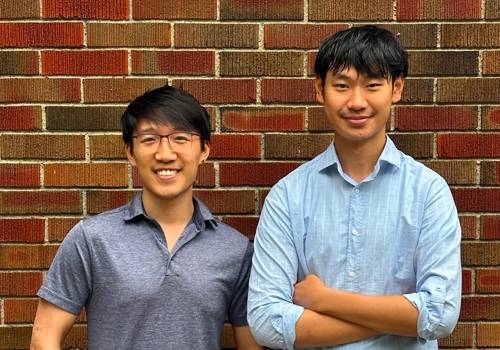With the ink barely dry on his master’s degree from the University of Toronto, Alex Cui is tackling a towering issue spawned by the recent revolution in artificial intelligence tools like ChatGPT: How to tell if written content is generated by person or machine?
Enter Cui’s startup GPTZero. It analyzes patterns in writing, using sentence length and syntax to identify the likelihood text was generated by AI.
“GPTZero has a lot of imagination and potential in a future where AI is everywhere and it’s rampant,” says Cui, who studied computer science as a master’s student in the Faculty of Arts & Science and graduated in June.
"We haven't even really cracked the surface of what we could do.”
Cui co-founded GPTZero with Edward Tian last January — just a few weeks after ChatGPT went public and triggered a torrent of questions about academic integrity and authenticity — and has already drawn the attention of Silicon Valley investors, raising more than US$3.5-million to date.
As institutions around the world grapple with the impact of generative AI, U of T has advised faculty to be clear with students about whether AI is permitted in their classrooms and actively discourages the use of all AI detectors, many of which are still in development, in favour of traditional methods of assessing students’ work.

Cui’s fascination with AI started at University of Toronto Schools — a private high school for academic high-achievers — and at U of T’s Faculty of Applied Science & Engineering’s renowned DEEP Summer Academy. That early affiliation with U of T granted regular access to lectures featuring A&S faculty, who, even a decade ago, urged Cui and his classmates to learn AI skills as soon as possible.
After high school, Cui earned his bachelor’s degree from the California Institute of Technology — also known as the prestigious Caltech — but kept his Toronto connections. As an undergrad, he interned with one of the world’s leading experts on self-driving cars, U of T’s Raquel Urtasun, professor in the Department of Computer Science and co-founder of the Vector Institute for Artificial Intelligence.
When Cui returned to U of T, Urtasun supervised his master’s thesis, which included writing code for the Waabi self-driving truck.
“U of T is one of the world leaders in machine learning,” says Cui. “There's no other ecosystem in the industry that combines AI innovation, commercialization and research partnerships.”
As GPTZero’s chief technology officer, Cui is overseeing fresh innovations, including plugins for Microsoft and Google products that help users detect AI text in any document or on any website.
Cui sees GPTZero offering immense value for other sectors, including publishing. He says the volume of author submissions is growing exponentially, especially with AI-driven content. Software like his could help editors determine what’s been written authentically, and how to take the writing to the next level.
Cui still gets support from U of T as an alum. GPTZero recently started consulting with the Creative Destruction Lab at the Rotman School of Management, and it’s also a member of the Vector Institute’s FastLane program, that advances AI adoption for Canadian startups and scaleups.
"Alex is an exceptional and experienced researcher and builder. His accomplishments speak for themselves. He is humble, knowledgeable and great to work with,” says Vector’s Junid Ebadi, FastLane business analyst, industry innovation.
"GPTZero is a fast-growing, well-resourced, and driven company. They have been great partners for us, and we are happy to support them in their journey.”
Cui hopes his story will ease the stress of aspiring startup founders.
“It's not as scary as you think. Especially in AI right now, a lot of people want to make bets on promising ideas, and I think if you are a talented individual solving a pressing issue, there's a good chance you can get some investors to fund your ideas,” he says.
Despite the attention from media and investors, Cui is staying humble and focused on remaining a leader in AI detection.
“We have people who are betting on us, but I wouldn't say we're proven yet. To build a sustainable business, you can't just be a flash in the pan. We're still very much in the mindset that we are priming ourselves to go up against some stiff competition. We’re not going to take any liberties.”

